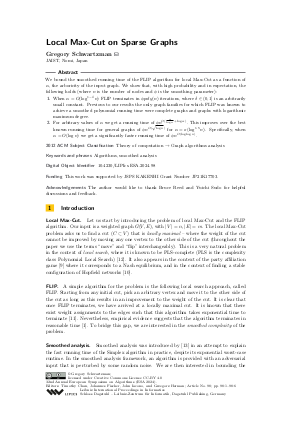Local Max-Cut on Sparse Graphs
Author Gregory Schwartzman
-
Part of:
Volume:
32nd Annual European Symposium on Algorithms (ESA 2024)
Part of: Series: Leibniz International Proceedings in Informatics (LIPIcs)
Part of: Conference: European Symposium on Algorithms (ESA) - License:
 Creative Commons Attribution 4.0 International license
Creative Commons Attribution 4.0 International license
- Publication Date: 2024-09-23
File

PDF
LIPIcs.ESA.2024.98.pdf
- Filesize: 0.57 MB
- 6 pages
Document Identifiers
Subject Classification
ACM Subject Classification
- Theory of computation → Graph algorithms analysis
Keywords
- Algorithms
- smoothed analysis
Metrics
- Access Statistics
-
Total Accesses (updated on a weekly basis)
0PDF Downloads0Metadata Views
Abstract
We bound the smoothed running time of the FLIP algorithm for local Max-Cut as a function of α, the arboricity of the input graph. We show that, with high probability and in expectation, the following holds (where n is the number of nodes and ϕ is the smoothing parameter):
1) When α = O(log^{1-δ} n) FLIP terminates in ϕ poly(n) iterations, where δ ∈ (0,1] is an arbitrarily small constant. Previous to our results the only graph families for which FLIP was known to achieve a smoothed polynomial running time were complete graphs and graphs with logarithmic maximum degree.
2) For arbitrary values of α we get a running time of ϕ n^{O(α/(log n) + log α)}. This improves over the best known running time for general graphs of ϕ n^{O(√{log n})} for α = o(log^{1.5} n). Specifically, when α = O(log n) we get a significantly faster running time of ϕ n^{O(log log n)}.
Cite As Get BibTex
Gregory Schwartzman. Local Max-Cut on Sparse Graphs. In 32nd Annual European Symposium on Algorithms (ESA 2024). Leibniz International Proceedings in Informatics (LIPIcs), Volume 308, pp. 98:1-98:6, Schloss Dagstuhl – Leibniz-Zentrum für Informatik (2024)
https://doi.org/10.4230/LIPIcs.ESA.2024.98
BibTex
@InProceedings{schwartzman:LIPIcs.ESA.2024.98,
author = {Schwartzman, Gregory},
title = {{Local Max-Cut on Sparse Graphs}},
booktitle = {32nd Annual European Symposium on Algorithms (ESA 2024)},
pages = {98:1--98:6},
series = {Leibniz International Proceedings in Informatics (LIPIcs)},
ISBN = {978-3-95977-338-6},
ISSN = {1868-8969},
year = {2024},
volume = {308},
editor = {Chan, Timothy and Fischer, Johannes and Iacono, John and Herman, Grzegorz},
publisher = {Schloss Dagstuhl -- Leibniz-Zentrum f{\"u}r Informatik},
address = {Dagstuhl, Germany},
URL = {https://drops.dagstuhl.de/entities/document/10.4230/LIPIcs.ESA.2024.98},
URN = {urn:nbn:de:0030-drops-211694},
doi = {10.4230/LIPIcs.ESA.2024.98},
annote = {Keywords: Algorithms, smoothed analysis}
}
Author Details
Funding
This work was supported by JSPS KAKENHI Grant Number JP21K17703.
Acknowledgements
The author would like to thank Bruce Reed and Yuichi Sudo for helpful discussions and feedback.
References
-
Omer Angel, Sébastien Bubeck, Yuval Peres, and Fan Wei. Local max-cut in smoothed polynomial time. In STOC, pages 429-437. ACM, 2017.

-
Albert-László Barabási and Réka Albert. Emergence of scaling in random networks. science, 286(5439):509-512, 1999.

-
Ali Bibak, Charles Carlson, and Karthekeyan Chandrasekaran. Improving the smoothed complexity of FLIP for max cut problems. ACM Trans. Algorithms, 17(3):19:1-19:38, 2021.

-
Xi Chen, Chenghao Guo, Emmanouil-Vasileios Vlatakis-Gkaragkounis, Mihalis Yannakakis, and Xinzhi Zhang. Smoothed complexity of local max-cut and binary max-csp. In STOC, pages 1052-1065. ACM, 2020.

-
Talya Eden, Reut Levi, and Dana Ron. Testing bounded arboricity. ACM Trans. Algorithms, 16(2):18:1-18:22, 2020.

-
Talya Eden, Dana Ron, and C. Seshadhri. Faster sublinear approximation of the number of k-cliques in low-arboricity graphs. In SODA, pages 1467-1478. SIAM, 2020.

-
Robert Elsässer and Tobias Tscheuschner. Settling the complexity of local max-cut (almost) completely. In ICALP (1), volume 6755 of Lecture Notes in Computer Science, pages 171-182. Springer, 2011.

-
Michael Etscheid and Heiko Röglin. Smoothed analysis of local search for the maximum-cut problem. ACM Trans. Algorithms, 13(2):25:1-25:12, 2017.

-
Alex Fabrikant, Christos H. Papadimitriou, and Kunal Talwar. The complexity of pure nash equilibria. In STOC, pages 604-612. ACM, 2004.

-
John J Hopfield. Neural networks and physical systems with emergent collective computational abilities. Proceedings of the national academy of sciences, 79(8):2554-2558, 1982.

-
David S. Johnson, Christos H. Papadimitriou, and Mihalis Yannakakis. How easy is local search? J. Comput. Syst. Sci., 37(1):79-100, 1988.

-
Alejandro A. Schäffer and Mihalis Yannakakis. Simple local search problems that are hard to solve. SIAM J. Comput., 20(1):56-87, 1991.

-
Daniel A. Spielman and Shang-Hua Teng. Smoothed analysis of algorithms: Why the simplex algorithm usually takes polynomial time. J. ACM, 51(3):385-463, 2004.

